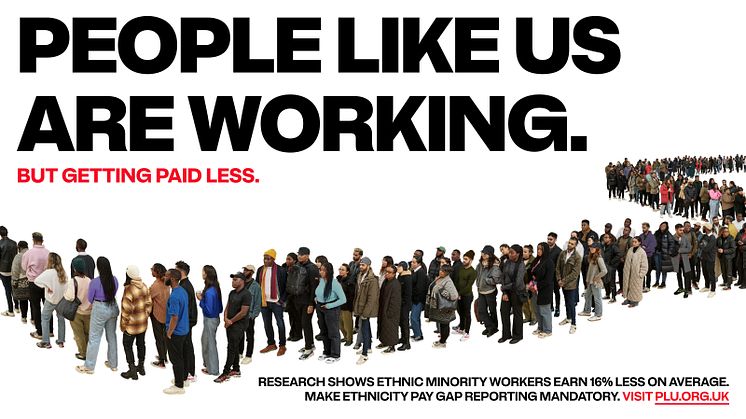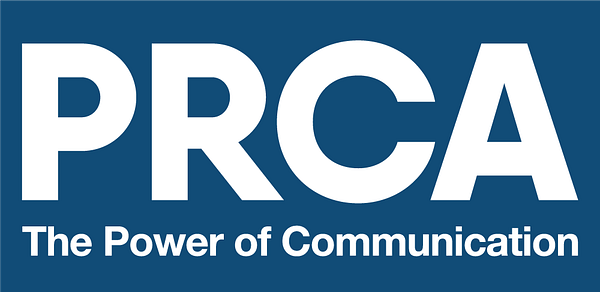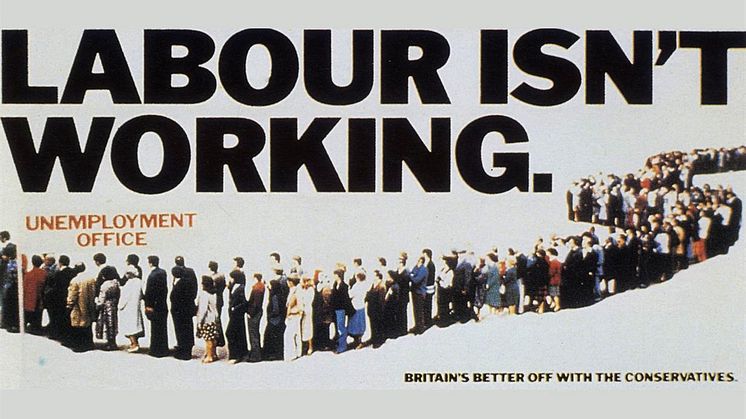
Press release -
Iconic ‘LABOUR ISN’T WORKING’ advert reimagined: Non-profit asks government for mandatory ethnicity pay gap reporting
- Non-profit People Like Us has recreated the iconic ‘Labour isn’t working’ advert, instead featuring a lengthy queue of workers from Black, Asian, Mixed Race and minority ethnic backgrounds
- People Like Us research reveals professionals from racially diverse backgrounds are paid 16% less than their white counterparts
- People Like Us calls for the British public to sign this petition to make ethnicity pay gap reporting mandatory in the UK, as it is for gender
The Conservatives’ iconic ‘Labour Isn’t Working’ advert has been subverted by non-profit People Like Us as part of a new campaign designed to raise the alarm on pay inequality faced by ethnic minority workers in the UK. The reimagined artwork depicts a line of people from Black, Asian, Mixed Race and minority ethnic backgrounds “queuing for a pay rise”, with text highlighting how they’re paid an average of 16% less than their white counterparts. The campaign launch follows the Prime Minister’s major speech last week, where he stated that creating better-paid jobs and opportunity across the country was a priority for growing the economy.
Ethnicity pay gap reporting has been debated in parliament over the past two years though there are currently no plans to make ethnicity pay gap reporting mandatory. The Commission on Race and Ethnic Disparities’ report and subsequent “Inclusive Britain” report published in March 2022 recommended that businesses report disparities voluntarily although there have been low levels of uptake. There have been joint calls for the bill from organisations including the Equality and Human Rights Commission, The Trade Union Congress and the Confederation of British Industry.

The original poster created by the Conservative Party in 1978
Stark ethnicity pay gap
In 2022, People Like Us revealed research which shows workers from Black, Asian, Mixed Race and minority ethnic backgrounds are paid 84% of what their white counterparts earn. It also found that two thirds (67%) of racially diverse working professionals polled said they have had reason to believe that a white colleague doing the same job as them was on a higher salary. A quarter (24%) said they suspected the disparity in pay was up to £5,000, meaning people of colour could be losing out on £255,000 of earnings in a working lifetime due to the stark racially ethnic pay gap*.
Of those from racially diverse backgrounds who struggled to ask for a salary increase or promotion, over a quarter (26%) left their industry because they weren't given a pay rise they felt they deserved while half (50%) said not getting a salary increase or promotion has caused them to suffer with anxiety or depression.
Cost of living crisis
Recent research from People Like Us and Censuswide showed professionals surveyed from Black, Asian, Mixed Race and minority ethnic backgrounds say government support will not see them through the next six months, a rate 7% higher than their white counterparts (52% vs 45%). This is causing them to dip into savings at a greater rate, with ethnic minority professionals’ savings declining 1.3x faster than their white colleagues (falling 16% vs. last year; compared to 13% for white professionals). Therefore professionals from racially diverse backgrounds are facing a two-fold crunch, in which they are getting too little government support, and will also ‘run out of road’ faster than their white colleagues when it comes to their savings.
Sheeraz Gulsher, co-founder of People Like Us commented:
“Imagine if the government announced a flat, 16% monthly tax on your entire earnings next week. That is the reality today for Black, Asian, Mixed Race and minority ethnic employees in the UK. If your skin isn't White, you can work the same amount and get paid 16% less. It's a tax on the colour of your skin. The most frustrating part is that this isn't a problem without a solution; since Gender Pay Gap reporting was introduced in 2017, the gender pay gap has decreased – it’s still there, but it's gradually moving in the right direction as businesses put more action behind equality. We want the same principles to be applied to workers from an ethnic minority background.
“Mandatory ethnicity pay gap reporting will allow businesses to have a clear snapshot of how workers are paid, enabling them to address discrimination head-on. Businesses must be held to account publicly and workers deserve to know where they stand in terms of pay.
"As we head towards a recession and the cost of living crisis is hitting lower earners the hardest, we must take this simple step to address disparities and make tangible change in the lives of Black, Asian, Mixed Race and minority ethnic workers in the UK.”
Campaign credits (all supported People Like Us pro bono):
Creative: Tom Lee (Media Bounty)
Digital Campaign: Kerim Hudson, Alexandra Vojtku, Myles Palmer, Axelle Van de Goor (Companion Studio)
Photographer: Mikael Buck
Videographer: Adam Nicholas (Soul Club Media)
Retouching: Ben Swanson and Patrick Sampson (The Wizard Retouch)
Media agency: VCCP
Supporting agencies: PrettyGreen, Hope&Glory PR and The Romans
About People Like Us
People Like Us is an award-winning not-for-profit that celebrates and supports UK media, marketing and communications professionals from Black, Asian, Mixed Race and minority ethnic backgrounds. It does this by profiling individuals through quarterly networking events and by supporting professionals with tailored solutions on a range of career related challenges. This includes navigating tricky conversations in the workplace, finding mentors, LinkedIn/CV-shaping and, more broadly, advising organisations on inclusivity.
People Like Us is also on a mission to help foster a fairer workplace for allthrough equitable pay – and not just for those from ethnically diverse backgrounds, and not only those from the marcomms industries.
For more details: www.plu.org.uk.
For all media enquiries, please email sgulsher@gmail.com or visit www.plu.org.uk.
Reference to January research in the ‘Stark Ethnicity Pay Gap’ section
Research was conducted by Censuswide, among a sample of 1,200 UK working professionals aged 16+. Censuswide abides by and employs members of the Market Research Society which is based on the ESOMAR principles. The survey took place in 2022.
*This calculation is based on an estimated average working life duration of 38 years.
Reference to ‘Cost of Living Crisis’ section
Research was conducted by Censuswide, among a sample of 2,023 working professionals aged 16+. Censuswide abides by and employs members of the Market Research Society which is based on the ESOMAR principles. The survey took place in October 2022.
Topics
The Public Relations and Communications Association (PRCA) is the world’s largest professional PR body.
Representing 35,000 PR professionals in 82 countries worldwide, we are a global advocate for excellence in public relations. Our teams across Europe, the Middle-East and Asia-Pacific work with professionals around the world to co-ordinate our operations across six continents.
Our mission is to create a more professional, ethical, and prosperous PR industry. We champion - and enforce - professional standards around the world through our Professional Charter and Code of Conduct. The Code compels members to adhere to the highest standards of ethical practice.
We deliver exceptional training, authoritative industry data, and global networking, and development opportunities.
We also manage the International Communications Consultancy Organisation (ICCO) - the umbrella body for 41 PR associations and 3,000 agencies across the world. Additionally, we support the delivery of the Motor Industry Communicators Association (MICA).



